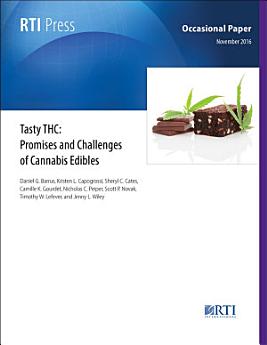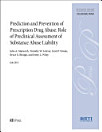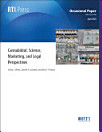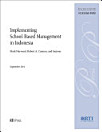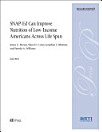Tasty THC: Promises and challenges of cannabis edibles
About this ebook
About the author
BS, is a laboratory technician in the Pharmacology group of RTI International’s Center for Drug Discovery. Mr. Barrus conducts nonclinical behavioral pharmacology and toxicology research.
PhD, is a research economist in RTI’s Food, Nutrition, and Obesity Policy Research Program. Dr. Capogrossi conducts economic analysis of nutrition policy, food safety regulation, food production and marketing, and related areas using econometrics, simulation modeling, statistical analysis, and other methods.
BA, a senior research policy analyst in RTI’s Food, Nutrition, and Obesity Policy Research Program, has more than 25 years of experience conducting consumer behavior research related to nutrition and food safety. She conducts studies to assess consumer use and understanding of labeling features and response to alternative label formats. Her research also assesses the impact of educational interventions on outcomes related to healthy eating and foodborne illness prevention
JD, MA, is a public health research policy analyst in the Center for Health Policy Science and Tobacco Research at RTI International. She has worked with the US Food and Drug Administration’s Center for Tobacco Products evaluating state and local tobacco control policies, and has served as project manager on two internally funded nationwide surveys to gather the opinions of adults around the country about marijuana use and legalization and the types of e-cigarette products adolescents use most often.
PhD, is a research epidemiologist in RTI International’s Behavioral and Urban Health Program. His research concentrates on the etiology, correlates, and consequences of psychiatric disorders, with a particular focus on early intervention for adolescents and young adults. Dr. Peiper works with Dr. Scott Novak on National Institutes of Health (NIH)- and SAMHSA-funded grants related to prescription drugs, injection drug use, marijuana, and psychiatric comorbidity.
PhD, is a senior research public health analyst in RTI’s Behavioral Health Research Division. His current work focuses on characterizing the epidemiological trends and identifying the at-risk populations for prescription drug abuse and co-occurring illicit drug use.
MA, manages RTI International’s Neurobehavioral Laboratory. Mr. Lefever has been conducting preclinical behavioral research for over 13 years and has been testing the effects of cannabinoids in these models extensively during the past 5 years.
PhD, is a leading expert in behavioral pharmacology. Dr. Wiley designs and supervises a program of in vivo research at RTI International, including the synthesis and development of candidate medications and investigation of neural mechanisms underlying substance abuse. She also conducts independent NIH grant-supported research in the area of cannabinoid pharmacology.
